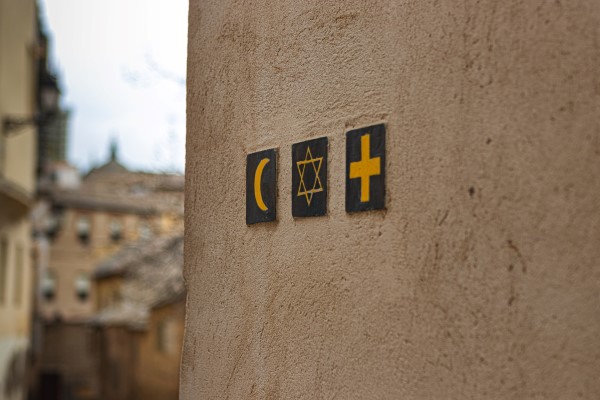As stated in the preceding blog post, the three main populous monotheist (one God) belief systems in the world are Judaism, Christianity, and Islam.
That is the chronological order i.e., the Jewish root in Christianity is well established, then Islam’s subsequent proclamation in the 7th century.
Of course, age itself is not the criterion to determine truth, but evidence and facts themselves. It is, however, important to note because it helps to get a clearer understanding and perspective on the message of each.
We will look briefly at the foundational beliefs of each to decide which is the more grounded, rational, and valid position, based on historical and evidentiary facts. That approach, however, presupposes a mental perspective, as opposed to the heart or spirit of a person which is the real part of us (Genesis 2:7). We need to recognize and appreciate both.
Judaism
JUDAISM is the world’s oldest monotheistic belief system, what is typically referred to as “religion”, dating back nearly 4,000 years.
Followers of Judaism believe this one God revealed Himself to them through the ancient prophets, as well as a religious lifestyle based on scriptures and innumerable rabbinic traditions. This established a covenant, or special agreement from God to them.
They, as well as all the other “religions” in the world, except true, authentic Christianity, believe that God rewards good deeds while punishing evil. In other words, it is based primarily and solely on the individual’s performance.
Where Does the Term “Jew” Come From?
The word “Jew” originates with the ancient Israelite kingdom of Judah, and is a shortened form of the word, though there is controversy as to what it means. It is interesting that all three of the aforementioned belief systems, consider Abraham the “father” of their faith so to speak.

Yet Abraham was technically a Gentile, a Latin term for the word “nation.” When the word Gentiles is used in Scripture, it simple means “the nations” or “not Jewish”.
Abraham was never referred to by the term “Jew.” He started out as a member of one the many nations or ethnic groups that existed during his time.
Genesis 11:26-28 tells us that Abram, (before God changed his name to Abraham), was born in and was from Ur of the Chaldeans (v. 28).
That is the region of ancient Mesopotamia, now known as the Middle East, which includes part of southwest Asia, and lands around the eastern Mediterranean Sea.
The first time the word “Jew” is used in the Bible was during the exile in 2 Kings 25:25. It appears to have been a term used by the Babylonians or Persians to refer to the people in their midst who came from the southern divided kingdom of Judah in the 2nd century BC.
Most Jews today, except for a few groups, do not believe their Messiah (from the Hebrew word Mashiach) which means “anointed one” (Lexicon: Strong’s H4899) has come yet, but will one day.
The Greek equivalent is the word Christos, or in English, Christ (Lexicon: Strong’s G5547). The name “Jesus Christ” is the same as “Jesus the Messiah.”
The primary reason most Jews in the first and ensuing centuries rejected Jesus was, because to them, He failed to do what they expected their Messiah to do.
They thought He would destroy their enemies and establish an eternal kingdom with Israel as the preeminent nation in the world. The prophecies in Isaiah 53 and Psalm 22 tell of a suffering Messiah who would be persecuted and killed. The Jews choose to focus instead on the other prophecies that describe His glorious victories, not His crucifixion.
Christianity
CHRISTIANITY, as stated above, has its roots in Judaism. That is established by the fact that the Old Testament laid the foundation for the New Testament.
It is the most widely practiced belief system in the world, with more than 2 billion followers.
The Old Testament gives the reasons for the need of a Messiah, and contains the history of the Jewish people, which foretells the purpose and plan for His coming. The New Testament reveals who the Messiah is and His mission to save humankind from our sin.
The central and core beliefs of Christianity focus on the birth, life, death, and most importantly, the resurrection of Jesus Christ. Christians maintain that Jesus will return to earth again, an event known as the Second Coming, to establish His kingdom (1 Thessalonians 5:1-3; 23; Acts 1:9-11, and many others).

When Did the Church Begin?
The church (ekklesia or “called-out assembly; Lexicon: Strong’s G1577), officially began 50 days after Jesus’ resurrection. Jesus’ prediction of this was recorded in Matthew 16:18, and the fulfillment was described and recorded in Acts 2:1-4, with the coming of the Holy Spirit.
As stated above and history clearly documents, the initial converts to Christianity were Jews or proselytes to Judaism, and the church was centered in Jerusalem.
Due to that, Christianity was first thought to be a Jewish sect, like the Pharisees, Sadducees, or Essenes. However, what the apostles and disciples taught and preached, was radically different than what the other Jewish groups were teaching.
The apostles explained and proclaimed that Jesus was in fact the Jewish Messiah, who had come to fulfill the law (Matthew 5:17) and establish a new covenant based on His death (Mark 14:24). This message did not go over well with many of the Jews of that day, nor to most Jewish people today, as well as many Gentiles (nations) in our current time.
What Makes Christianity Different?
The key piece of evidence that one should consider when deciding the truthfulness of Christianity above all other belief systems, is the resurrection of Jesus Christ.
I highly recommend you listen to our Bible teaching videos on the resurrection which covers and presents from an historical perspective, the overwhelming evidence for that event. Keep in mind, that we are not making a scientific presentation or claim, but an evidentiary one. In a scientific method on any subject matter, things must be observable, measurable, and repeatable (crossexamined.org).
For instance, no one was present at the time of creation to actual observe it. Therefore, it is a non-repeatable event that cannot be measured. It is based on common sense and faith.
We use historical, evidentiary, logical and reasonableness methods like you would in a courtroom. All the teachings I present on this blog or our free Bible teachings, will be based on this premise. They will appeal to what is more reasonable and plausible to believe and consider.
Islam
ISLAM is the second largest belief system (what is called religion) after Christianity, with about 1.9 billion Muslims worldwide.
Scholars typically date the creation of Islam to the 7th century, making it the youngest of the major world religions. (history.com editors; britannica.com)
Islam began with the prophet Muhammad (sometimes spelled Mohammed or Mohammad) about 622 BC. He was an Arab merchant. Islam means “surrender” or “submission” to the will of God.
Islam’s central article of faith is that “there is no god but Allah (God in Arabic; islamicity.org) and Muhammad is His messenger.” He claims to have received Allah’s word through an angel of God, though he initially feared his revelation had come from Satan.
Muslims believe several prophets were sent to teach Allah’s law and recognize Adam, Noah, Abraham, Moses, and Jesus as significant, but Muhammad contended he was the last and greatest of all God’s prophets.
The Qur’an (or Koran), the major holy text of Islam provides very little detail of Muhammad’s life.
The Hadith (personal sayings of the prophet), however, were largely compiled in the centuries following Muhammad’s death, and provide a larger narrative for the events in his life (although there is much debate in the Muslim world which Hadiths are accurate). (khanacademy.org)

Differences Between Islam and Christianity
Although there are some similarities between Islam and Christianity, (both are monotheistic) there are significant differences. I will just briefly touch on four areas:
1. Muhammad acknowledged his need to seek God’s forgiveness on occasion (Surah 40:55). Jesus Christ was above reproach in every way (2 Corinthians 5:21).
2. The will of Allah is more basic to who He is than His love or mercy. He can choose not to be merciful or not to love; thus, His mercy and love are not intrinsic to His nature. According to Islam, God cannot be considered a “father” and He has no son. Allah does not love sinners (Surah 3:140).
According to Christianity, God loves because His very nature is love (1 John 4:8), not just because He chooses to love. God’s mercies are an extension of His character, not arbitrary choices He makes. God the Father has an eternal relationship with God the Son (Jesus, Yeh’shua in Hebrew). God does love sinners (Romans 5:8).
3. Islam believes that the Torah (the first 5 books of the Old Testament), the Psalms, and the Gospels were given by God, but Jews and Christians have corrupted God’s Word, therefore Bibles cannot be fully trusted.
Biblical Christianity teaches that the Old and New Testaments are God’s inspired Word and the only authority of faith and practice (2 Timothy 3:16). Further, the Bible warns against adding to God’s Word (Revelation 22:18); therefore, Christians reject the Qur’an as an attempt to add to God’s Word and that it is a document that contradicts the Bible in many ways.
4. Islam (as well as ALL other man-made religions) teaches a works-based salvation. A Muslim must keep the five pillars of Islam and that the day of judgment will involve a person’s good and bad deeds being weighed in a balance. Their standard for judgment is one’s own actions (Surah 7:8-9; 21:47). The Qur’an forbids anyone from bearing another person’s sin (Surah 17:15; 35:18) and particularly denies the death of Jesus (or Isa) on the cross (Surah 3:55; 4:157-158). If you will be saved, you must save yourself.
Christianity teaches a grace-based salvation. A person is saved by the grace (the undeserved blessing of God), through faith in the death and resurrection of Jesus Christ (Ephesians 2:8-9; Romans 10:9-10). The standard for judgment is absolute perfection, which no one can measure up to. But God in His grace and mercy has given us His Son as the substitute for our sin. We cannot save ourselves, so we turn to Christ, our sinless Savior (Hebrews 12:2).
Judaism vs Christianity vs Islam: Conclusion
In summary, what we choose to believe in this life is of the utmost importance. In fact, I would argue there is absolutely nothing that even comes close to being as important. Why would I make such a statement? Because what we believe will determine our eternal destiny.
Now I realize that statement has invoked much debate and brought about a considerable amount of intense anger and hostilities to say the least down through human history. Wars have been fought, genocides have been committed, and every possible atrocity one can imagine has been perpetrated in the name of “religion”.
That is why I use the term “belief system” because there is a vast difference when compared to “religion”.
The overall idea is probably considered the same by most, but the point is this. When we look at the world scene, it appears most people in whatever culture, nation, society, tribe, or ethic group they belong to would equate “religion” as the following:
Any sort of rules, regulations, duties, commands, and obligations they must perform to be in right standing with whomever God or gods they believe in.
The bottom line is this. No one since the beginning of humans’ existence on this planet has ever live a perfect life in terms of moral behavior, consciencely or unconsciously, in thought, word or deed. (Except Jesus Christ. 1 Peter 2:22)
“All have sinned and fall short of the glory of God.” (Romans 3:23)
I do not think there is any person in human history who would disagree with that statement.
If we are honest, we are all very much aware of our human frailties. We know we have come up short. We can try to justify that by comparing ourselves to others (which is not wise, 2 Corinthians 10:12), but if the requirement is perfection, then obviously everyone fails.
If you say it’s not perfection but just the best you can do, then where is the line drawn? If we just look at the words of Jesus in the New Testament and realize God’s criteria is not just based on action and behavior, but our thought life as well (Matthew 5:28), we know, all are in trouble when we must stand alone before Him in the end.
But we will not have to stand alone before God in our own so-called righteousness in the end if we receive the pardon God offers in Christ. (John 1:12 along with 1 John 2:2). This is what clearly separates Christianity from all other belief systems in the world. No other “religious” leader in history has ever seriously claimed deity in the sense they actual believed they were God in the flesh.
Jesus of Nazareth stands alone in that proclamation and proved it by His resurrection from the dead, as verified by numerous witnesses and much evidence. That event alone, should conclusively prove which belief system is the truth.


Greg is a very smart man and I consider him a friend…and I don’t have many friends.
Doc holiday
Pastor Greg,
thank you so much for your sound teaching. I like how you research and investigate to prove your information. I also thank God for gifting you as a teacher.
I have a question though, probably just some clarification.
I always thought the centuries were numbered forward after the death of Jesus (AD) and subtracted backwards before His birth (BC).
If the first century is AD, then if Islam started in 7 BC (please see above -“Islam began with the prophet Muhammad (sometimes spelled Mohammed or Mohammad) about 622 BC.”) that would make it seem that Islam is older than Christianity which is against what you have taught us.
So, I wondered is Judaism would be dated BC while Christianity and Islam would be AD.
I could be misunderstanding.
Thank you for your help.
Thank you for your comment Arit. I appreciate your input.
Yes, the numbering system regarding the centuries can be and are often times confusing. I have to stop and think a little myself when I hear or read something in reference a particular century to associate it with what years are being referred to. So don’t think you are the only one. It is not uncommon.
Regarding the third line of your comment, I seems to me if I am understanding you correctly, that we should be adding backwards from Jesus’ birth in reference to BC, not subtracting, although I can see why you would state it that way. Maybe I am misunderstanding you or just not seeing it the way you are stating it, so I don’t want to confuse the matter any more than it already is.
To keep it simple regarding the timeline of Jesus and Muhammad, there is a clear unanimity opinion in the historical scholastic world, that Muhammad, and therefore Islam, came about approximately 600 years after Jesus, who came to earth in what the majority of the world recognizes as the first century (the years 1-99).
The year 48 BC for example would be stating 48 years before Christ, and going backward from there, say the year 500 BC, would be 500 years before Christ.
I know this can be even more than moderately confusing at times, so I hope this helps and hasn’t made it more confusing.
Thank you again for your comment and taking the time to read my blog. I hope to add more interesting, biblical and historically based blogs and videos in the coming year, so check in again when you get time.
I hope you have a very Merry CHRISTmas season!
P.S. By the way, thank you for the respectful title, but I am not a Pastor, but a teacher.